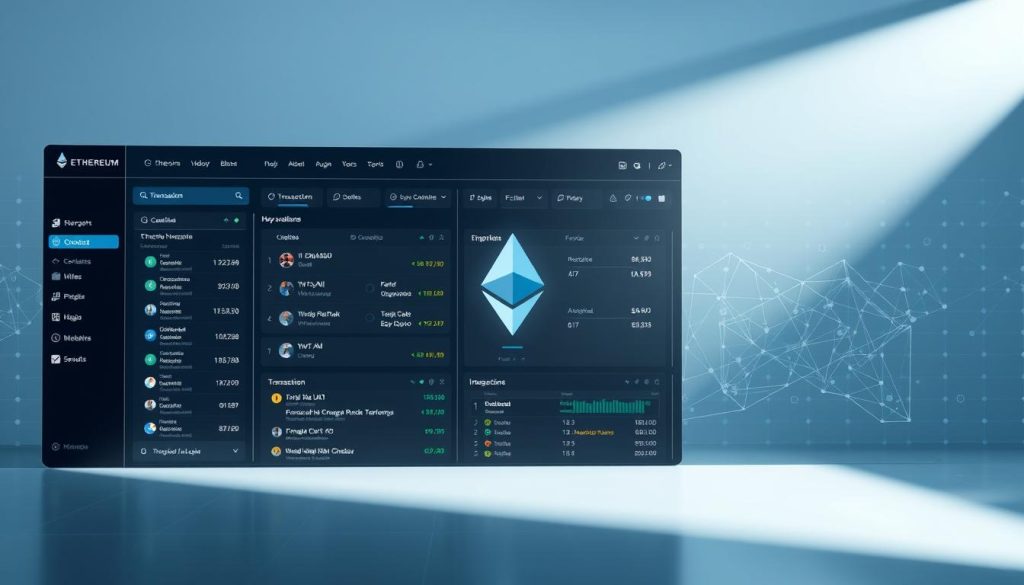Quantum computing could process complex calculations 158 million times faster than advanced classical supercomputers. This incredible speed hints at the potential of quantum computing in transforming digital finance.
Quantum computing is a technological frontier reshaping blockchain technology in fascinating ways. As computational power grows, the link between quantum mechanics and cryptocurrency becomes more intriguing.
The future of digital transactions may look very different. Quantum computers could solve complex cryptographic challenges that secure Bitcoin networks.
This breakthrough opens up new opportunities and challenges for investors and technologists. It could revolutionize how we approach digital finance strategies.
Key Takeaways
- Quantum computing offers exponentially faster computational capabilities
- Bitcoin’s blockchain technology might undergo significant transformations
- Cryptographic security could be revolutionized by quantum advancements
- Potential risks and opportunities exist in quantum computing bitcoin integration
- Understanding this technology is crucial for future digital finance strategies
Understanding Quantum Computing
Quantum computing is a game-changing technology that defies traditional computation methods. It surpasses classical computing by harnessing quantum principles for unmatched computational power.
Quantum hardware and software create a unique computational system. This system uses quantum mechanics to process information differently than classical computers.
What is Quantum Computing?
Quantum computing uses subatomic particles to perform complex calculations. Unlike traditional computers with bits, quantum computers use qubits that exist in multiple states simultaneously.
- Processes information using quantum mechanics principles
- Leverages quantum states for advanced computational capabilities
- Enables solving complex problems exponentially faster
Key Principles of Quantum Computing
Two fundamental quantum principles define this revolutionary technology:
- Superposition: Allows qubits to represent multiple states at once
- Entanglement: Enables instantaneous communication between quantum particles
| Quantum Computing Feature | Computational Advantage |
|---|---|
| Qubits | Exponential information processing |
| Quantum Superposition | Parallel computation capabilities |
| Quantum Entanglement | Instantaneous quantum state interactions |
Differences Between Classical and Quantum Computing
Classical computers process information linearly. Quantum computing hardware uses probabilistic quantum states. This allows quantum computers to solve complex problems much faster than traditional systems.
“Quantum computing isn’t just faster – it’s fundamentally different.” – Quantum Research Institute
Quantum computing software keeps improving. It’s expanding possibilities in science, finance, and technology.
Bitcoin: An Overview
Digital currency has changed finance, with Bitcoin leading the way. Blockchain technology enables secure, transparent transactions across global networks.
Bitcoin is a decentralized digital currency without traditional banking infrastructure. An anonymous developer created it in 2009.
Understanding Bitcoin’s Fundamental Characteristics
- Decentralized digital currency
- Peer-to-peer transaction network
- Limited total supply of 21 million coins
- Secured by advanced cryptographic protocols
How Bitcoin Transactions Work
Bitcoin transactions use blockchain for transparency and security. Each transaction is recorded on a distributed digital ledger.
This prevents duplicate spending and maintains transaction histories. The process ensures the integrity of all Bitcoin exchanges.
| Transaction Aspect | Description |
|---|---|
| Transaction Initiation | User sends Bitcoin from digital wallet |
| Network Verification | Miners validate transaction through complex algorithms |
| Blockchain Recording | Verified transaction permanently added to public ledger |
Blockchain Technology’s Critical Role
Blockchain is the backbone of Bitcoin. It enables secure, transparent, and decentralized financial transactions.
This system removes middlemen and boosts transaction security. It’s revolutionizing how we think about and use money.
“Bitcoin is a technological tour de force.” – Bill Gates
By 2023, Bitcoin has gained widespread acceptance globally. 420 million cryptocurrency users worldwide now use this innovative digital financial system.
The Intersection of Quantum Computing and Bitcoin
Quantum computing and cryptocurrency are reshaping digital finance. This revolution brings new approaches to protecting assets. Quantum cryptography is changing how we think about encryption.
Quantum computing’s power could greatly impact Bitcoin’s infrastructure. Its effects go beyond simple tech upgrades.
Potential Impact on Bitcoin Security
Bitcoin’s cryptographic systems face challenges from quantum computing. Researchers have found key areas of vulnerability.
- Potential to break current encryption algorithms
- Risk of compromising private key security
- Ability to perform complex mathematical calculations faster than classical computers
Advantages of Quantum Computing for Cryptocurrency
Quantum computing offers great chances for cryptocurrency growth. Advanced computational techniques could transform how we process transactions and secure networks.
| Quantum Computing Feature | Potential Cryptocurrency Benefit |
|---|---|
| Rapid Computational Speed | Faster Transaction Verification |
| Advanced Encryption Techniques | Enhanced Network Security |
| Complex Problem Solving | Improved Blockchain Algorithm Design |
Quantum computing and Bitcoin mark an exciting frontier in digital finance. Despite challenges, the potential for innovation is huge.
Quantum Threats to Bitcoin Security
Quantum computing poses a complex challenge for cryptocurrency security. Bitcoin faces potential vulnerabilities as quantum technologies advance. These could reshape digital asset protection strategies.
Quantum computing security is crucial for cryptocurrency defense. These advanced systems could compromise existing cryptographic protocols. Their capabilities are unprecedented in the digital world.
Cryptographic Vulnerabilities
Bitcoin’s cryptographic infrastructure relies on complex mathematical algorithms. Quantum computers might rapidly decrypt these algorithms. This poses significant risks to the system.
- Potential breakdown of elliptic curve cryptography
- Vulnerability of public key encryption
- Risk of wallet private key exposure
“Quantum computers could theoretically solve cryptographic challenges in minutes that would take classical computers thousands of years.” – Quantum Security Expert
Case Studies of Cyber Attacks
Research shows quantum cryptography could expose critical security weaknesses. Several theoretical scenarios highlight potential breach mechanisms.
- Shor’s algorithm targeting cryptographic signatures
- Quantum decryption of transaction authentication
- Advanced key generation manipulation
Long-Term Risks of Quantum Computing
Quantum computing’s long-term implications for Bitcoin security go beyond immediate technical challenges. Quantum computational power could fundamentally transform cryptocurrency’s existing security paradigms.
Experts predict quantum technologies might create unprecedented cryptographic disruptions. This could require proactive adaptation strategies from blockchain networks.
Enhancing Bitcoin with Quantum Computing
Quantum computing opens new doors for cryptocurrency technologies, especially Bitcoin. This cutting-edge tech could transform digital financial systems in ways we’ve never seen before.
It merges quantum algorithms with blockchain, creating exciting possibilities. These advancements could reshape how we handle digital money.
- Dramatically accelerate computational processes
- Enhance security infrastructure
- Optimize complex mathematical calculations
Improved Mining Efficiency
Quantum algorithms could reshape Bitcoin mining. Traditional mining needs lots of computer power. But quantum computing brings huge efficiency improvements.
Miners using quantum tech might solve tricky puzzles much faster. This could change how we mine Bitcoin forever.
Smarter Smart Contracts
Quantum computing could make smart contracts much smarter. The quantum internet would allow for more complex and secure contracts.
This tech could speed up transactions and make blockchains more reliable. It’s a game-changer for how we use smart contracts.
Quantum Communication and Bitcoin Transactions
Quantum communication could make Bitcoin transactions super secure. It uses special quantum properties to protect digital money transfers.
This tech could create unhackable ways to send Bitcoin. It’s a big step forward in keeping digital assets safe.
The future of Bitcoin lies not in resisting technological change, but in embracing quantum computing’s transformative potential.
Predictions for Quantum Computing and Bitcoin
Quantum computing and cryptocurrency are merging to create new tech possibilities. Experts are watching how these technologies might change our digital world. Quantum supremacy is becoming more achievable.
Quantum entanglement and advanced computing will change many industries. Bitcoin is at the forefront of this tech revolution. Researchers predict big changes in digital currencies and computing power.
Future Trends in Quantum Computing
- Accelerated development of quantum processors
- Increased investment in quantum research
- Potential breakthrough in quantum error correction
- Enhanced computational speed beyond classical computing limits
Expert Predictions on Bitcoin’s Future
Quantum computing could change Bitcoin’s cryptographic structure. Experts see both challenges and opportunities in this new tech landscape.
| Prediction Area | Potential Impact | Timeframe |
|---|---|---|
| Cryptographic Security | Potential vulnerability to quantum attacks | 5-10 years |
| Transaction Processing | Faster, more efficient blockchain verification | 3-7 years |
| Mining Efficiency | Significant computational advantages | 4-8 years |
Potential Market Changes
Quantum computing and Bitcoin could cause big market shifts. Investors and tech experts are watching these changes closely. They see potential for major innovation.
“Quantum computing represents the next frontier in cryptocurrency technology, offering unprecedented computational capabilities that could redefine digital financial systems.” – Dr. Elena Rodriguez, Quantum Computing Researcher
As quantum technologies advance, Bitcoin and other cryptocurrencies must adapt. They need to innovate to stay competitive in this changing tech world.
Tools for Exploring Quantum Computing and Bitcoin
Quantum computing and Bitcoin exploration require the right tools and resources. This cutting-edge field offers exciting challenges for beginners and tech enthusiasts alike. Let’s explore essential quantum computing software and hardware platforms.
Quantum Computing Platforms to Explore
Several platforms lead the way in quantum computing software. These make advanced technology more accessible to users.
- IBM Quantum Experience: A free cloud-based quantum computing platform
- Google Cirq: Open-source quantum computing framework
- Microsoft Azure Quantum: Cloud quantum computing services
- Rigetti Quantum Cloud Services: Comprehensive quantum computing infrastructure
Bitcoin Wallets and Privacy Tools
Robust security tools are essential for protecting your digital assets.
| Wallet Name | Key Features | Quantum Resistance |
|---|---|---|
| Ledger Nano X | Hardware wallet with advanced security | High |
| Trezor Model T | Touchscreen hardware wallet | Medium |
| BlueWallet | Mobile Bitcoin wallet with Lightning Network | Low |
Educational Resources on Quantum Technology
Continuous learning is crucial in this fast-changing field. Here are top resources for understanding quantum computing:
- Coursera Quantum Computing Specialization by University of California, Berkeley
- MIT OpenCourseWare Quantum Computing Lectures
- Quantum Computing Report website
- edX Quantum Technology Professional Certificate
The quantum computing field changes rapidly. Keep learning and experimenting with these tools and platforms. Your curiosity will guide you through this exciting landscape.
Graphs and Statistics on Quantum Computing and Bitcoin
Quantum computing and Bitcoin are at the forefront of tech innovation. These groundbreaking technologies are evolving rapidly, reshaping the digital landscape. Understanding their current state is vital for investors and tech enthusiasts.
Quantum Technology Advancement Insights
Quantum computing is making impressive strides. Recent research shows its processing power doubles every 6-9 months. The global market is set to hit $65 billion by 2030.
Major tech companies are investing over $1 billion yearly in quantum research. This investment fuels rapid advancements in the field.
- Quantum computing processing power has doubled approximately every 6-9 months
- Global quantum computing market expected to reach $65 billion by 2030
- Major tech companies investing over $1 billion annually in quantum research
Bitcoin Market Trends and Quantum Impact
Quantum computing brings both challenges and opportunities to Bitcoin. Market projections show potential transformations in the coming years. The table below illustrates these changes.
| Year | Bitcoin Value | Quantum Computing Influence |
|---|---|---|
| 2023 | $30,000 | Emerging Potential |
| 2025 | $50,000 | Increased Security Concerns |
| 2030 | $100,000 | Quantum-Resistant Protocols |
Public Perception Survey Results
A recent survey reveals interesting insights about public understanding. Many believe quantum computing will greatly impact cryptocurrency. Some worry about Bitcoin’s long-term security.
- 62% of respondents believe quantum computing will significantly impact cryptocurrency
- 45% express concerns about Bitcoin’s long-term security
- 33% are actively researching quantum-resistant investment strategies
“Quantum computing isn’t just a technological breakthrough—it’s a potential game-changer for Bitcoin’s future.” – Tech Innovation Weekly
These stats highlight the crucial link between quantum computing and Bitcoin. They show the need for ongoing adaptation in digital currency. The future of Bitcoin depends on its ability to evolve with quantum tech.
Frequently Asked Questions
Quantum computing security and blockchain technology have sparked intense debate among tech enthusiasts. Our experts have compiled pressing questions to help you understand this complex landscape. These insights will guide you through emerging technological shifts.
Quantum computing could disrupt Bitcoin’s current cryptographic infrastructure. Advanced quantum machines might compromise existing encryption methods, creating challenges for blockchain networks. IBM’s recent quantum computing developments showcase rapid progress in this field.
Can Quantum Computing Break Bitcoin?
Quantum computing poses theoretical risks to Bitcoin’s security. However, current quantum technologies can’t immediately compromise blockchain networks. Experts predict robust quantum computing capabilities might emerge within the next decade.
This timeline prompts proactive adaptation strategies from blockchain developers. They’re working to stay ahead of potential threats.
How Can Bitcoin Adapt to Quantum Threats?
Bitcoin’s development community is exploring quantum-resistant cryptographic algorithms. These solutions include advanced encryption techniques to counter quantum attacks. Blockchain technology keeps evolving to address new challenges.
This ongoing development ensures long-term network resilience. It’s a testament to the adaptability of blockchain technology.
What Should Investors Know?
Investors should stay informed about quantum computing security developments. Diversification and understanding technological trends are crucial. The blockchain ecosystem shows remarkable adaptability in addressing potential vulnerabilities.
While quantum threats exist, there’s no need for panic. Staying educated and prepared is the best approach.










 Bitcoin
Bitcoin  Ethereum
Ethereum  Tether
Tether  XRP
XRP  USDC
USDC  Solana
Solana  JUSD
JUSD  TRON
TRON  Lido Staked Ether
Lido Staked Ether